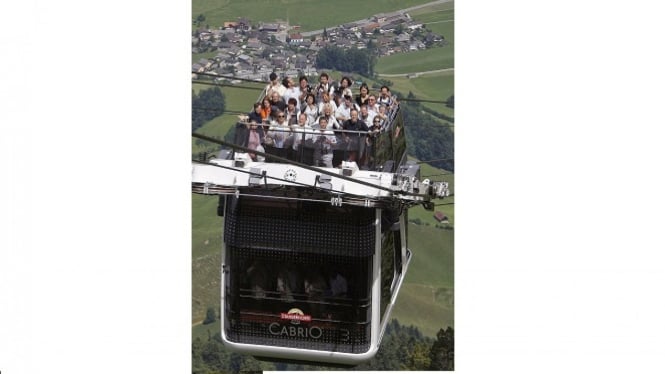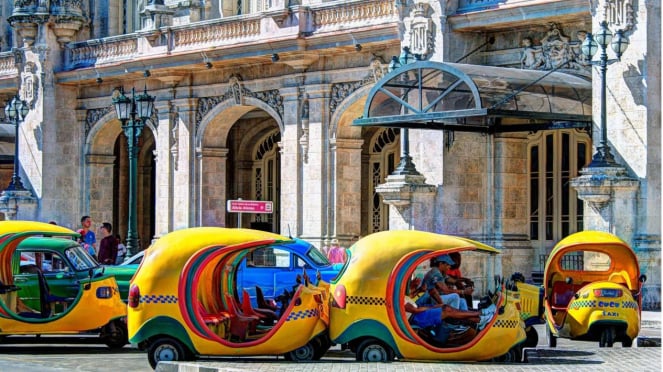5 Unusual Modes of Public Transportation in the World
- http://duniasejutawarna.blogspot.com/
VIVA – Public transportation is one way to reduce congestion on the streets. Take a public transportation has many benefits. The attractiveness of public transportation in each country is different. However, it turns out that various countries have unique public transportation.
With the uniqueness that is given, sometimes it becomes an attraction for local residents and tourists who visit. This certainly has a positive impact in reducing traffic congestion and becoming a source of livelihood for local residents.
Here’s a list of unique transportation around the world:
1. Tricycle, Coco Taxi
Cocotaxis
- flickr
Busy Cuban cities like Havana, Varadero, and Trinidad have invented a vehicle to transport tourists or local people, called Coco Taxis. Cocotaxis is a tricycle-like vehicle that is driven by a person and has room for two or three drivers in the back.
In Indonesia, this vehicle is similar to the Bajaj. The cost starts at around one Cuban Convertible Peso (CUC) that is cheaper than regular taxis.
2. Sled, Toboggan
Kereta Luncur atau Toboggan
- flickr
The Toboggan is a sled-shaped transport found on the northwestern coast of Africa. People can quickly travel downhill from Monte to Funchal on this sled.
This unique mode of public transportation first appeared around 1850 on the islands due to its rugged volcanic terrain with high cliffs and steep hills. Nowadays, sleds are widely used by tourists who want to try something new.
3. Tricycle Taxi, Cyclo
Cyclo, transportasi unik di Vietnam
- flickr
Cyclos have a history dating back to the French colonial period in Vietnam and became popular after the country's failed attempts at other modes of transportation.
Like a taxi with three wheels, it can accommodate two passengers in the front and the driver in the back. The cyclo design makes a lot of sense on the busy streets of Hanoi and Ho Chi Minh City.
Unfortunately, this unique and popular mode of public transportation is being reduced as the prices of regular taxis drop and various cyclo safety issues arise. Visitors still use the cyclo for tours, but the general public is starting to switch to ordinary cars.
4. Water Taxi, Vaporetto
Taksi Air
- flickr
Venice, Italy is located on the Venetian Lagoon which is a 310 square mile body of water connected to the Adriatic Sea via three canals. Due to the city's winding waterways, water taxis are a great form of transportation, especially for tourists who want to see the city efficiently.
Water taxis otherwise known as Vaporetto is an affordable way to get around the city quickly.
There is even water bus transportation available from Venice city center to Venice Marco Polo Airport. Travel cards for Venice's public transport can be purchased for a day or more for €20. Sit back, relax and feel like a Venetian for a day on this historic canal.
5. Hanging Monorail, Wuppertaler Schwebebahn
The Wuppertaler Schwebebahn is a suspended monorail system in the city of Wuppertal, West Germany. The monorail first opened in 1901 and remains a staple of public transportation in the area today and has moved millions of people every year. The 8.3-mile line runs parallel to the Wupper River at about 37 mph with service to 20 stations.
Apart from enjoying the scenery, tourists in the area should try to ride the Kaiserwagen, the famous red train that still travels frequently. As well as transporting people daily, the monorail remains an important historical and cultural landmark for locals and visitors alike.
6. Urban Cable Car, Mi Teleférico
Kereta gantung ditengah perkotaan di La Paz, Bolivia
- flickr
In the metropolitan area of La Paz-El Alto, Bolivia there is an urban cable car system called Mi Teleférico. This unique cable car system provides easier access to all ends of the city and does not require walking.
Cable car tickets are inexpensive (starting at just US$0.43) and the gondola comes every 12 seconds. Apart from the ease of use, visitors love the view.
This cable car is the highest in the world and has panoramic views of the snow-capped Andes Mountains including the 21,122-foot Mount Illimani.





























